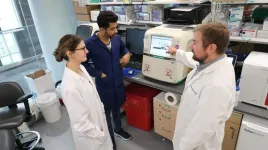(Press-News.org) Toddlers in the UK obtain nearly half (47%) of their calories from ultra-processed foods (UPFs), and this rises to 59% by the age of seven, according to a new study led by UCL researchers.
The study, published in the European Journal of Nutrition, looked at data from 2,591 children born in the UK in 2007 and 2008 whose parents recorded what their children ate and drank over three days.
The most common UPFs consumed by the toddlers – who were 21 months when their parents recorded their diets – were flavoured yoghurts and wholegrain breakfast cereals, products typically seen as healthy. By the age of seven, the most common UPFs were sweet cereals, white bread and puddings.
Lead author Dr Rana Conway, of the UCL Institute of Epidemiology & Health Care, said: “Ultra-processed foods are not all bad for our health and the foods typically eaten by the toddlers in our study are ones that are seen as quite healthy.
“However, some wholegrain cereals and flavoured yoghurts have high levels of added sugar and salt and our study found that toddlers who consumed more ultra-processed foods also had a higher intake of these ingredients.
“This is concerning, especially as toddlers in general consume more added sugar and salt than is recommended.
“Aside from sugar and salt, a diet that includes a lot of ultra-processed food is less likely to get children used to the natural flavours of whole foods and therefore less likely to encourage healthy eating later in life.”
Senior author Professor Clare Llewellyn, of the UCL Institute of Epidemiology & Health Care, said: “Eating patterns in the early years are important, as they help set habits that can persist through childhood and into adulthood. This was reflected in our findings, with 21-month-olds who ate more ultra-processed foods also likely to be higher consumers of ultra-processed foods at the age of seven.”
The researchers analysed data from the Gemini twin cohort study, using the Nova classification to divide the food and drink consumed into four groups: unprocessed or minimally processed foods (eggs, milk, vegetables, fish and fruit); processed culinary ingredients (salt, butter and oil); processed foods (tinned fish, peanut butter and cheese); and UPFs (cereals, yoghurts, industrially made sliced bread, biscuits, sausages, crisps).
UPFs are typically industrially produced and contain ingredients not used or very rarely used in home cooking, such as emulsifiers, colourings and sweeteners.
Toddlers were divided into five groups according to their ultra-processed food intake. The research team found that toddlers in the lowest UPF group consumed 28% of their calories from UPFs, while for toddlers in the highest of the five groups this was 69%.
They also found that ultra-processed foods consumed at 21 months predicted UPF consumption at seven years old. Toddlers who consumed the most UPFs were 9.4 times more likely to be in the highest UPF-consuming group at age seven compared to toddlers who consumed the lowest proportion of UPFs. The research team said this may be partly attributable to the “hyperpalatable” nature of these UPFs, as they tend to be foods higher in fat, sugar and/or salt.
In all five UPF groups, the toddlers’ consumption of free sugars exceeded the UK government recommended maximum of 5% of daily calorie intake. In the two highest UPF groups, added sugar intake exceeded 10% on average.
The researchers called for policies to redress the balance of children’s diets towards a lower proportion of UPFs, such as restricting the promotion of unhealthy foods marketed towards children, adding warning labels to products (e.g. those that are high in sugar), and subsidising fresh and minimally processed food.
Dr Conway said: “It’s not easy to feed children healthily in our current food environment. Highly processed foods are often cheaper than the foods parents would like to give their children, such as fresh fruit and vegetables.
“Also, despite labels suggesting they’re a healthy choice, ultra-processed foods marketed for children often contain too much sugar and salt. This makes it harder for parents to make healthy choices.”
In the paper, the research team also said there was a range of commercial products intended for young children that would not be classified as a UPF as they did not contain UPF-style ingredients but mimicked UPFs in terms of textures. These might include vegetable sticks or puffs or snacks resembling cookies.
Early exposure to these foods, the researchers wrote, was unlikely to encourage consumption of vegetables, even if the foods’ nutritional content was healthy (i.e., they did not include added sugar or salt).
In their study limitations, the researchers noted that people of white ethnicity and a higher socioeconomic status were over-represented in their population sample compared to the UK population as a whole.
END
Toddlers get nearly half their calories from ultra-processed foods
Toddlers in the UK obtain nearly half (47%) of their calories from ultra-processed foods (UPFs), and this rises to 59% by the age of seven, according to a new study led by UCL researchers
2024-10-04
ELSE PRESS RELEASES FROM THIS DATE:
Detroit researchers to examine links between bacterial infections, environmental pollution and preterm birth
2024-10-03
DETROIT — A new grant will help Wayne State University researchers explore the links between bacterial infections, the environmental factors that increase their susceptibility and the risk of preterm birth.
The five-year, $2,858,821 grant from the National Institute of Environmental Health Sciences of the National Institutes of Health, “PFAS increases susceptibility to infection-mediated preterm birth,” will be led by Michael Petriello, Ph.D., assistant professor in Wayne State’s Institute of Environmental Health Sciences and Pharmacology in the School of Medicine.
Petriello hopes that the team’s studies will identify critical pathways responsible ...
In lab tests, dietary zinc inhibits AMR gene transmission
2024-10-03
Highlights:
Antimicrobial resistance is a growing threat.
Bacteria exchange AMR genes in the gut via circular genetic material called plasmids.
In lab experiments, bacteria transferred plasmids with AMR genes in the presence of zinc at reduced or nonexistent rates.
Stopping the transfer without killing microbes may help reduce AMR without disrupting the gut microbiome.
Washington, D.C.—Genes responsible for antimicrobial resistance (AMR) can spread from microbe to microbe through circular genetic material called plasmids, and ...
Two UMD Astronomy space probes advance to next round of $1 billion NASA mission selection
2024-10-03
On October 3, 2024, NASA announced that two space probes proposed by University of Maryland astronomers have advanced to the next round of consideration for a $1 billion mission slated to launch into orbit in 2032.
The selected probes include the Advanced X-ray Imaging Satellite (AXIS) mission with UMD Astronomy Professor Christopher Reynolds as its principal investigator and the PRobe far-Infrared Mission for Astrophysics (PRIMA) with UMD Astronomy Professor Alberto Bolatto as a co-investigator and NASA Goddard Space Flight Center researcher and UMD Astronomy ...
New MSU research sheds light on impact and bias of voter purging in Michigan
2024-10-03
MSU has a satellite uplink/LTN TV studio and Comrex line for radio interviews upon request.
Images and Podcast
EAST LANSING, Mich. – In recent years, some states have prioritized purging their voter rolls of those who have passed away or moved out of state. During election season, there is often increased discussion about the necessity and impact of these actions. Voter purging can be an important step for creating election integrity, but others have raised concerns about how the process is conducted and who it targets.
So, are there negative effects of voter purging? Researchers from Michigan State University wanted to find out — especially ...
Funding to create world's first ovarian cancer prevention vaccine
2024-10-03
In this study, the Cancer Research UK-funded scientists will establish the targets for the vaccine. They will find out which proteins on the surface of early-stage ovarian cancer cells are most strongly recognised by the immune system and how effectively the vaccine kills mini-models of ovarian cancer called organoids.
If this research is successful, work will then begin on clinical trials of the vaccine. The hope is that in the future, women could be offered this vaccine to prevent ovarian cancer in the first place.
There are around 7,500 new ovarian ...
Scientists develop novel method for strengthening PVC products
2024-10-03
COLUMBUS, Ohio – Researchers have developed a way to make one type of plastic material more durable and less likely to shed dangerous microplastics.
The study identified a secure way to attach chemical additives to polyvinyl chloride (PVC).
Found in everything from toys, construction supplies and medical packaging, PVC plastics currently rank third among the most used plastics worldwide. Despite its widespread use, pure PVC is brittle and sensitive to heat, and manufacturers can only utilize it after stabilizing its properties with other chemicals.
However, these additives, or plasticizers, ...
Houston Methodist part of national consortium to develop vaccine against herpesviruses
2024-10-03
Houston Methodist researchers will be part of a national consortium funded by an up to $49 million award from the U.S. Government’s Advanced Research Projects Agency for Health (ARPA-H) to develop a vaccine against two of the most common and destructive strains of herpesviruses that latently infect a majority of Americans and can lead to acute infections, multiple forms of cancer, autoimmune disease and birth defects.
The award is part of ARPA-H’s Antigens Predicted for Broad Viral Efficacy through Computational Experimentation (APECx) program and will fund the America’s SHIELD project ...
UT Health San Antonio School of Dentistry earns first NIH grant under new center for pain therapeutics and addiction research
2024-10-03
SAN ANTONIO, Oct. 3, 2024 – The School of Dentistry at The University of Texas Health Science Center at San Antonio (UT Health San Antonio) earned the first National Institutes of Health grant under its new Center for Pain Therapeutics and Addiction Research, addressing pain in patients with head and neck carcinoma.
The nearly $600,000 grant by the NIH’s National Institute of Dental and Craniofacial Research will address this critical pain issue that significantly impairs quality of life. Many head and neck carcinoma patients require opiate pain management, but tolerance develops quickly, requiring new pain ...
Do MPH programs prepare graduates for employment in today's market? Mostly yes, but who is hiring may be surprising
2024-10-03
Public health degree programs provide key competencies demanded by employers, but graduate employability could be improved by using more real-time data from employer job postings, according to a new study at Columbia University Mailman School of Public Health. This could help public health schools and programs ensure that graduates obtain specific technical skills listed in job postings, meet current employer needs, and prepare graduates for the demands of today’s labor market. The findings are published in the American Journal of Public Health.
The competencies required for the ...
New article provides orientation to using implementation science in policing
2024-10-03
Since the 2020 murder by Minneapolis police of George Floyd brought nationwide calls for change amid concerns that prevailing practices were not grounded in evidence and created harm, policing has been in turmoil. Implementation science (IS) involves integrating effective and evidence-based innovations into routine practice in fields like health care. Yet despite its potential, IS—and specifically, evidence-based policing (EBP)—remain vastly understudied and unused in police settings. In a new article, researchers provide an orientation to these issues ...
LAST 30 PRESS RELEASES:
New study reveals floods are the biggest drivers of plastic pollution in rivers
Novel framework for real-time bedside heart rate variability analysis
Dogs and cats help spread an invasive flatworm species
Long COVID linked to Alzheimer’s disease mechanisms
Study reveals how chills develop and support the body's defense against infection
Half of the world’s coral reefs suffered major bleaching during the 2014–2017 global heatwave
AI stethoscope can help spot ‘silent epidemic’ of heart valve disease earlier than GPs, study suggests
Researchers rebuild microscopic circadian clock that can control genes
Controlled “oxidative spark”: a surprising ally in brain repair
Football-sized fossil creature may have been one of the first land animals to eat its veggies
Study finds mindfulness enables more effective endoscopies in awake patients
Young scientists from across the UK shortlisted for largest unrestricted science prize
Bison hunters abandoned long-used site 1,100 years ago to adapt to changing climate
Parents of children with medical complexity report major challenges with at-home medical devices
The nonlinear Hall effect induced by electrochemical intercalation in MoS2 thin flake devices
Moving beyond money to measure the true value of Earth science information
Engineered moths could replace mice in research into “one of the biggest threats to human health”
Can medical AI lie? Large study maps how LLMs handle health misinformation
The Lancet: People with obesity at 70% higher risk of serious infection with one in ten infectious disease deaths globally potentially linked to obesity, study suggests
Obesity linked to one in 10 infection deaths globally
Legalization of cannabis + retail sales linked to rise in its use and co-use of tobacco
Porpoises ‘buzz’ less when boats are nearby
When heat flows backwards: A neat solution for hydrodynamic heat transport
Firearm injury survivors face long-term health challenges
Columbia Engineering announces new program: Master of Science in Artificial Intelligence
Global collaboration launches streamlined-access to Shank3 cKO research model
Can the digital economy save our lungs and the planet?
Researchers use machine learning to design next generation cooling fluids for electronics and energy systems
Scientists propose new framework to track and manage hidden risks of industrial chemicals across their life cycle
Physicians are not providers: New ACP paper says names in health care have ethical significance
[Press-News.org] Toddlers get nearly half their calories from ultra-processed foodsToddlers in the UK obtain nearly half (47%) of their calories from ultra-processed foods (UPFs), and this rises to 59% by the age of seven, according to a new study led by UCL researchers


